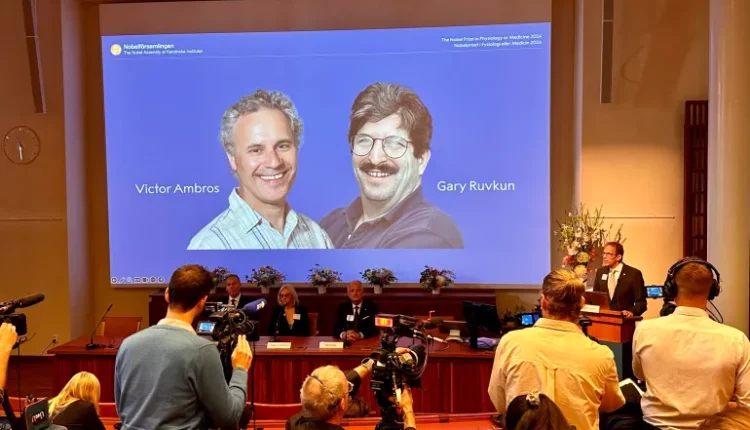U.S. scientists Victor Ambros and Gary Ruvkun won the 2024 Nobel Prize in Medicine for the discovery of microRNA and its crucial role in how multicellular organisms grow and live, the award-giving body said on Monday.
The Nobel assembly said in a statement that the laureates discovered the new class of tiny RNA molecules, which play a crucial role in gene regulation.
“Their groundbreaking discovery revealed a completely new principle of gene regulation that turned out to be essential for multicellular organisms, including humans,” the assembly said.
Their work helped explain how cells specialise and develop into different types, such as muscle and nerve cells, even though all the cells in an individual contain the same set of genes and instructions for growing and staying alive.
Thomas Perlmann, secretary of the Nobel committee for physiology, said he had reached Ruvkun by phone, waking him up early in the U.S. morning, but he was eventually happy and “very enthusiastic”. He had not yet reached Ambros, he said.
“(Ruvkun’s) wife answered. It took a long time till he came to the phone and he was very tired,” Perlmann said at a press conference.
Ambros is a professor at the University of Massachusetts Medical School, while Ruvkun is a professor at Harvard Medical School and also affiliated with Massachusetts General Hospital in Boston.
FIRST OF 2024 NOBEL PRIZES
The winners of the prize for physiology or medicine are selected by the Nobel Assembly of Sweden’s Karolinska Institute medical university and receive a prize sum of 11 million Swedish crowns ($1.1 million).
As every year, the physiology or medicine prize is the first in the crop of Nobels, arguably the most prestigious prizes in science, literature and humanitarian endeavour, with the remaining five set to be unveiled over the coming days.
Created in the will of Swedish dynamite inventor and businessman Alfred Nobel, the prizes have been awarded for breakthroughs in science, literature and peace since 1901, while economics is a later addition.
Different institutions award the prizes in the various fields, with Peace being the only one awarded in Oslo rather than Stockholm, possibly as a result of the political union that existed between the two Nordic countries when Nobel penned his will.
Past winners of the Nobel medicine prize include many famous researchers such as Ivan Pavlov in 1904, most known for his experiments on behaviour using dogs, and Alexander Fleming, who shared the 1945 prize for the discovery of penicillin.
Last year’s medicine prize was awarded to the runaway favourites Katalin Kariko, a Hungarian scientist, and U.S. colleague Drew Weissman, for discoveries that paved the way for COVID-19 vaccines that helped curb the pandemic.
Steeped in tradition, the science, literature and economics prizes are presented to the laureates in a ceremony on Dec. 10, the anniversary of Alfred Nobel’s death, followed by a lavish banquet at Stockholm city hall. Separate festivities attend the winner of the peace prize in Oslo on the same day.



Comments are closed.